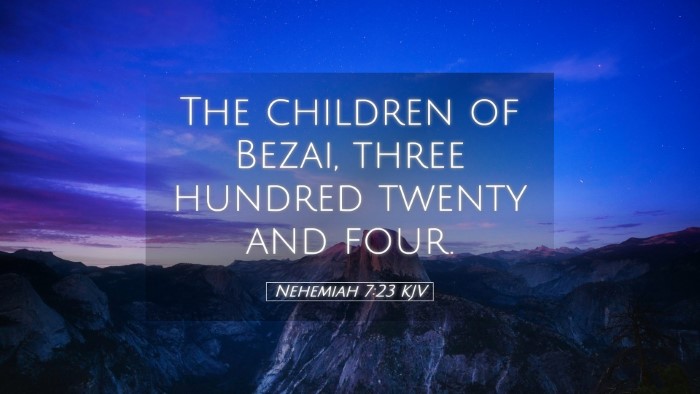Commentary on Nehemiah 7:23
Verse Reference: Nehemiah 7:23 – "The children of Benjamin, Salu the son of Meshullam, the son of Joed, the son of Pedaiah."
Introduction
This verse is part of Nehemiah's effort to re-establish and recount the list of those who returned from Babylonian exile. As a record of the returning exiles, it highlights the continuity of the tribes and families of Israel, crucial for the restoration and rebuilding of Jerusalem.
Contextual Analysis
The larger context of Nehemiah 7 lays a foundation to understand the significance of names and genealogies in the Hebrew narrative. Nehemiah derives authority from his heritage, portraying a revival of national identity. The importance of each family listed, especially that of Benjamin, emphasizes God's faithfulness to His covenant and the historical relevance of each tribe.
Insights from Public Domain Commentaries
Matthew Henry's Commentary
Significance of Genealogy: Henry emphasizes the importance of accounting for the people in the rebuilding of Jerusalem. The inclusion of genealogies serves not merely a bureaucratic purpose but establishes a claim to land and heritage. The family names serve as a reminder of God's promises.
Children of Benjamin: Henry notes that Benjamin is particularly significant; he was the youngest son of Jacob and played a crucial role in Israel's history. The mention of Salu and his father highlights the continuity of tradition and God's providential care through generations.
Albert Barnes' Notes on the Bible
Covenantal Remembrance: Barnes elaborates on how the genealogies symbolize a remnant that God has preserved through trials. He stresses that the descendants of Benjamin had not been lost but rather were being restored to their rightful place in Jerusalem.
Historical Reclamation: Barnes accentuates the importance of these records as they allowed the returning exiles to reclaim their heritage and position within God’s covenantal promise, reinforcing the belief that their return was divinely ordained.
Adam Clarke's Commentary
Identity and Belonging: Clarke reflects on how the names listed symbolize identity and belonging among the Jews. Each name carries a story and represents those who suffered loss and exile, yet are brought back together to rebuild their identity as a nation under God.
Faithfulness of God: Clarke also stresses that these genealogies reassure the Israelites of God’s faithfulness. The names in Nehemiah 7:23 are a testament that God remembers His people and calls them back into fellowship with Him, highlighting the theme of restoration after exile.
Theological Implications
The mention of the families in Nehemiah 7:23 has profound theological implications for understanding God’s redemptive plan.
- God’s Faithfulness: The faithful return of the exiles demonstrates God’s unwavering commitment to His covenant with Israel.
- Identity in Christ: For New Testament believers, the genealogies highlight the importance of identity through Christ, linking believers to the greater narrative of redemption.
- Role of Community: These verses remind us of the need for community in faith practices, where every disciple's identity contributes to the ecclesiastical body.
Applications for Today’s Believers
Nehemiah 7:23 encourages contemporary Christian leaders and scholars to consider how identity and heritage play important roles in ministry and community building.
- Embrace Heritage: Believers should honor their spiritual heritage while also seeking to reclaim lost identities within their communities.
- Foster Community: Just as the Israelites were called to rebuild together, churches today are called to foster solidarity in mission and support.
- Recognize God's Plan: Understanding that every believer is part of God's grand narrative encourages faithfulness in service and active participation in the kingdom work.
Conclusion
Nehemiah 7:23, while a simple record of names, encapsulates themes of restoration, identity, and God’s faithfulness to His people. In drawing from public domain commentaries, we see that these verses are not mere historical notes but powerful reminders of God's unchanging nature and the redemptive story that believers are a part of today.


